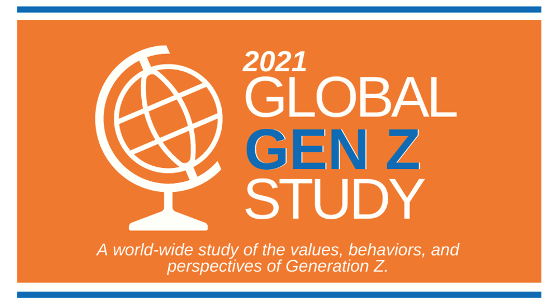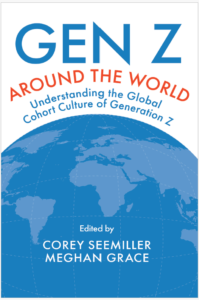 Overview of the Study
Overview of the Study
The study of generations offers a unique look at trends in attitudes and behaviors of individuals based on age and stage in life. Liken to studies by gender, religion, or race, for example, generational research can prove to be insightful in helping to uncover a peer personality of a group of individuals who share a demographic commonality. In this case, generations progress through childhood, adolescence, and adulthood at the same time, experiencing current events and societal factors during the same stage of life. These experiences contribute to the creation of a peer personality, resulting in members having similar attitudes, preferences, styles, and behaviors (Seemiller & Grace, 2019).
However, early studies about Generation Z were often conducted independently by researchers in various countries regarding their specific populations. While this is useful from a national perspective, being able to analyze data across geographic boundaries has been limited as the studies being used for comparison often employed different methodologies, survey questions, and even timing. Given the interconnectedness of the world today, there is a much stronger global peer personality of this generation than anticipated. No book currently exists that explores Generation Z across geographic and cultural boundaries on a global level, which is essential in that communication, technology, commerce, education, politics, health, travel, and work have become increasingly globalized. Learning about Generation Z from a global perspective can expand our understanding to better work with, engage with, supervise, and educate young people at a global level.
A Unique Global Focus and Foremost Experts on Generation Z
While this generation as a whole has received a great deal of attention in both scholarly publications and mainstream media, there is still limited research in understanding this demographic, particularly on a global level. Research and publications about Generation Z are primarily from U.S. sources. For example, Twenge (2017) looked at large-scale U.S. datasets to write her book, iGen. Similarly, the Pew Research Center (Parker & Igielnik, 2020), along with a number of market research firms, has also reported on this generation, with a specific focus on the U.S. While becoming more mainstream in the States, research about Generation Z in other countries (UK, Australia, and Canada, in particular) has just recently been gaining attention (e.g. Redmond, n.d., in the UK; McCrindle, n.d., in Australia; and Global News, 2018, in Canada). In other countries, research has been more limited, resulting in either a lack of information overall or the application of research findings from other countries (like the U.S.) to a cultural context vastly different than the study participants represent.
This study brought together researchers from around the world to garner participation in a joint research initiative, where the study is coordinated, both in using comparative survey questions (adjusted for linguistic and cultural appropriateness) as well as employing the same methodology and analysis procedures for validity. Doing so will allow for more direct comparisons between countries as researchers in all participating nations grapple with the transition of the Little Zs into adulthood.
Download the Generation Z Study Overview for more information.
 Gen Z Around the World
Gen Z Around the World
Gen Z Around the World is based on a global study of Generation Z that brought together 91 Gen Z expert researchers from a variety of disciplines from around the world to participate in a joint research initiative. More than 30,000 participants took part in the study from 81 different countries.
This book includes several of the most prominent researchers on Generation Z from around the world. Many have published books and articles on the topic, specific to their disciplines, and are the foremost experts on Generation Z research in their respective countries. Bringing the team together for one unified project, where individuals from different countries and backgrounds can collaborate, provides a more holistic view of Generation Z today.
Participating Countries
Global Research Team
Click here to learn about who is on the Global Gen Z Research Team.
Participating U.S. Institutions
- Augustana College
- Christopher Newport University
- College for Creative Studies
- College of the Canyons
- Fort Hays State University
- Kettering University
- Keystone College
- Lynn University
- Norwich University
- Oklahoma State University
- Rider University
- St. John Fisher College
- St. Norbert College
- Towson University
- University of Central Florida
- University of Dayton
- University of Southern Maine
- Wright State University
- Oral Roberts University
Human Subjects Information
See a copy of the Wright State University IRB Letter of Exemption.
Publications and Media
